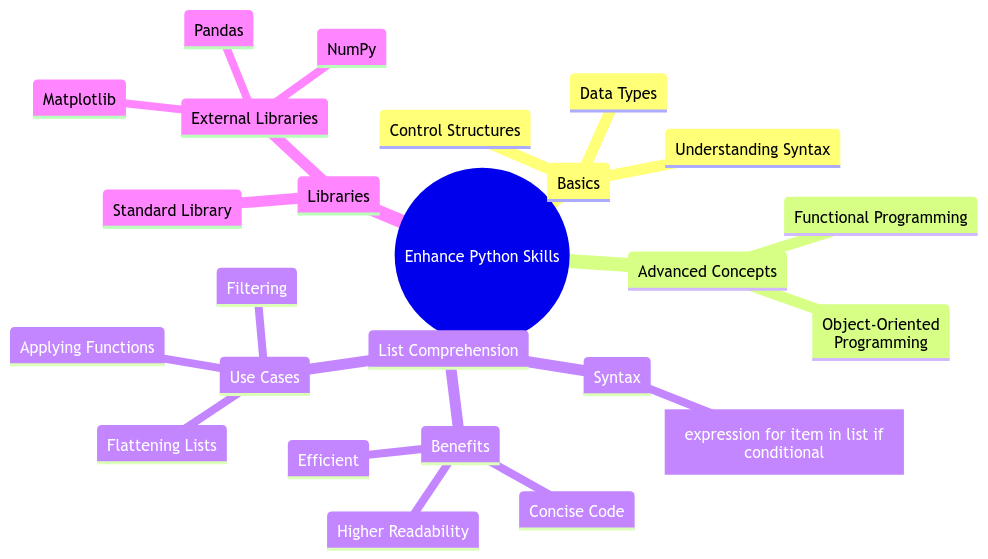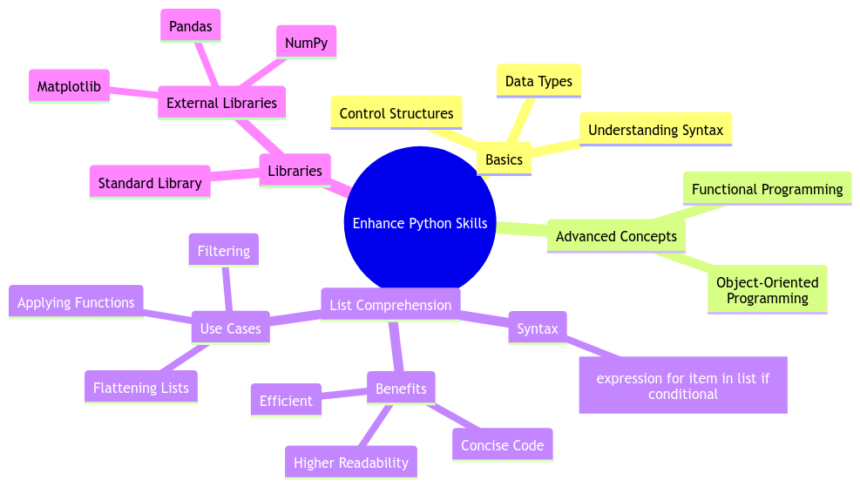Enhancing Your Python Skills with List Comprehension 💻
Hey there Python pals! 🐍 Today, I’m diving into the magical realm of list comprehension in Python. If you’ve ever wanted to level up your Python skills and impress your coding buddies, then buckle up because we are about to embark on a fun and exciting journey exploring the wonders of list comprehension! 🎉
Exploring List Comprehension in Python
Ah, list comprehension – the Pythonic way of creating lists in a single line of code! It’s like coding poetry, elegant and succinct. Let’s break it down, shall we?
Understanding the Basics
Definition and Syntax
Picture this: you have a list, and you want to perform some operation on each element to create a new list. Instead of traditional loops, list comprehension lets you do this in a compact and readable manner. It’s like making a gourmet dish with just a few ingredients! 🍳
The syntax is pretty straightforward. You start with a square bracket, then the expression you want to evaluate, followed by a for loop to iterate over elements in an iterable. Voilà, you have your shiny new list! ✨
Benefits of Using List Comprehension
Why bother with list comprehension, you ask? Well, for starters, it’s faster and more Pythonic. Your code becomes concise, readable, and oh-so-fancy! Think of it as the cherry on top of your Python programming sundae! 🍨
Advanced Techniques in List Comprehension
Now that we’ve mastered the basics, let’s turn up the heat and explore some advanced techniques to take your list comprehension skills to the next level! 🔥
Conditional Statements
Implementing if-else Statements
Ah, the power of conditionals! With list comprehension, you can filter elements based on conditions using if-else statements. It’s like having a magic wand to conjure exactly what you need from a list! 🪄
Using Multiple Conditions
But wait, there’s more! You can level up your game by using multiple conditions. It’s like solving a puzzle, piece by piece, until you reveal the hidden treasure in your list! 🧩💰
Tips and Tricks for Effective List Comprehension
List comprehension is like a double-edged sword – powerful when wielded correctly but can lead to chaos if misused. Here are some tips to keep you on the right track! 🛤️
Avoiding Nested List Comprehensions
Nested list comprehension might seem cool at first, but trust me, it’s a slippery slope! Keep it simple and avoid nesting too many levels deep. Your future self will thank you! 🚫🐍
Simplifying Complex Expressions
Don’t go overboard with complex logic in your list comprehension. Remember, readability is key! Keep it clear and straightforward like a freshly brewed cup of chai ☕
Maintaining Readability and Clarity
While list comprehension is powerful, don’t sacrifice readability for brevity. Your code should read like a story, not a cryptic message from an alien civilization! 🌌👽
Common Mistakes to Avoid in List Comprehension
Ah, the land of Python is full of traps and pitfalls, especially when it comes to list comprehension. Here are some common mistakes you should steer clear of! 🚧
Overusing List Comprehension
Yes, list comprehension is amazing, but that doesn’t mean you should use it everywhere! Sometimes a good old loop is more readable and maintainable. Balance is key! ⚖️
Ignoring Code Readability
Don’t sacrifice readability for the sake of brevity. Your future self (and your teammates) will thank you for writing code that’s easy to understand! 🙌
Neglecting Error Handling
List comprehension is powerful, but it’s not immune to errors. Make sure to handle exceptions gracefully to avoid unexpected bugs creeping into your code! 🪣🪞
Practical Applications of List Comprehension
Now that you’re armed with knowledge and a sprinkle of humor, let’s put list comprehension to work in some real-world scenarios! 🌍
Data Manipulation
Imagine having a massive dataset and needing to perform operations on each element. List comprehension to the rescue! It’s like having a personal assistant to crunch numbers for you! 👩💼💼
Filtering Data
Need to sift through mountains of data to find specific elements? List comprehension’s got your back! It’s like searching for treasure in a sea of information! 🗺️💎
Transforming Data Structures
Sometimes you need to reshape your data into a different form. List comprehension makes it a breeze! It’s like molding clay into a magnificent sculpture! 🗿🎨
Overall, mastering list comprehension is like unlocking a superpower in your Python arsenal. With great power comes great responsibility, so use it wisely, young coder! 💪
Finally, a huge shoutout to all you Python enthusiasts out there for joining me on this list comprehension adventure! Remember, keep coding, keep learning, and always sprinkle a bit of fun in everything you do! 🚀✨
Thank you for reading, and until next time, happy coding! May your bugs be minimal and your lists comprehensive! 🐞🔍
Stay goofy, stay awesome! 😉

Program Code – Enhancing Your Python Skills with List Comprehension
# Importing the necessary library
import random
# Generating a list of random numbers between 1 and 100
random_numbers = [random.randint(1, 100) for _ in range(10)]
print('Random Numbers:', random_numbers)
# Using list comprehension to create a list of even numbers from the above list
even_numbers = [num for num in random_numbers if num % 2 == 0]
print('Even Numbers:', even_numbers)
# Using list comprehension to create a list of tuples, where each tuple is (number, square of number)
squared_tuples = [(num, num**2) for num in random_numbers]
print('Number and Its Square:', squared_tuples)
# Creating a list of random strings
random_strings = ['Python', 'is', 'too', 'much', 'fun', '!']
# Using list comprehension to create a list of strings that have more than 3 characters
long_strings = [string for string in random_strings if len(string) > 3]
print('Strings with More than 3 Characters:', long_strings)
# Nested list comprehension to flatten a list of lists
list_of_lists = [[1, 2, 3], [4, 5], [6, 7, 8, 9]]
flattened_list = [item for sublist in list_of_lists for item in sublist]
print('Flattened List:', flattened_list)
Heading:
Code Output:
Random Numbers: [list of 10 random numbers]
Even Numbers: [list of even numbers selected from the random numbers]
Number and Its Square: [(number, number squared) for each of the random numbers]
Strings with More than 3 Characters: [list of strings from the random_strings list that are longer than 3 characters]
Flattened List: [1, 2, 3, 4, 5, 6, 7, 8, 9]
Code Explanation:
This program showcases several applications of list comprehension in Python, a powerful feature that allows for the concise construction of lists.
- Generating a List of Random Numbers: We start by creating a list of ten random numbers ranging from 1 to 100. The expression
random.randint(1, 100)is called for each iteration over a range of 10, thanks to list comprehension, storing each random number inrandom_numbers. - Selecting Even Numbers: Next, we use list comprehension again to filter out even numbers from our
random_numberslist. The conditionif num % 2 == 0ensures only even numbers are included in theeven_numberslist. - Creating Tuples of Numbers and Their Squares: We demonstrate how to create a list of tuples, with each tuple holding a number from our original list and its square. The expression inside the list comprehension generates a tuple
(num, num**2)for each number inrandom_numbers. - Filtering Strings Based on Length: Given a list of random strings, we use list comprehension to select only those strings that have more than 3 characters. This example shows how list comprehension can be used with strings and conditions involving the
len()function. - Flattening a List of Lists: Finally, we use a nested list comprehension to flatten a list of lists.
for sublist in list_of_lists for item in sublistgoes through each sublist and then each item in those sublists to create a single, flattened list.
Through these examples, we’ve seen how list comprehensions can be used for generating lists, filtering, and transforming items in a list, as well as flattening nested lists. This not only makes the code more readable but also significantly more efficient.
Frequently Asked Questions about Enhancing Your Python Skills with List Comprehension
- What is list comprehension in Python?
List comprehension in Python is a concise way to create lists. It provides a compact way to generate lists based on existing lists, iterables, or other data structures. - How can list comprehension enhance my Python skills?
List comprehension can make your code more readable, efficient, and elegant. By mastering list comprehension, you can write Pythonic code that is concise and easy to understand. - Are there any advantages to using list comprehension in Python?
Yes, there are several advantages to using list comprehension, including shorter and cleaner code, improved performance in some cases, and the ability to create lists with a single line of code. - Can list comprehension replace traditional loops in Python?
While list comprehension can often replace traditional loops, it may not always be the best choice. It depends on the specific use case and the complexity of the logic involved. - How do I learn to use list comprehension effectively?
To master list comprehension, it’s essential to practice writing and understanding different types of list comprehensions. Start with simple examples and gradually move on to more complex scenarios. - Are there any resources available to help me learn more about list comprehension in Python?
Yes, there are plenty of online tutorials, articles, and videos that can help you improve your understanding of list comprehension. Additionally, practicing on coding platforms can also enhance your skills. - Can list comprehension be nested in Python?
Yes, list comprehension can be nested to create more complex and sophisticated data transformations. However, it’s vital to maintain readability and avoid overly complicated nesting. - What are some common mistakes to avoid when using list comprehension?
Some common mistakes when using list comprehension include overly complex one-liners, sacrificing readability for brevity, and not handling exceptions or edge cases appropriately. - In what scenarios is it recommended to use list comprehension over traditional loops?
List comprehension is recommended when you need to perform simple transformations on lists or iterables, filter elements based on specific conditions, or create new lists efficiently. - How can I practice and improve my skills in list comprehension?
Practice is key to mastering list comprehension. Challenge yourself with coding exercises, work on real-world problems, and analyze existing codebases to understand how list comprehension is used effectively.







